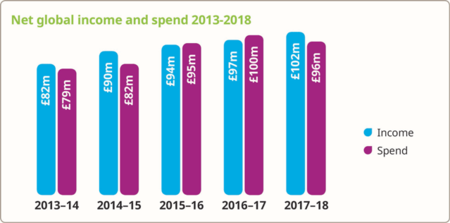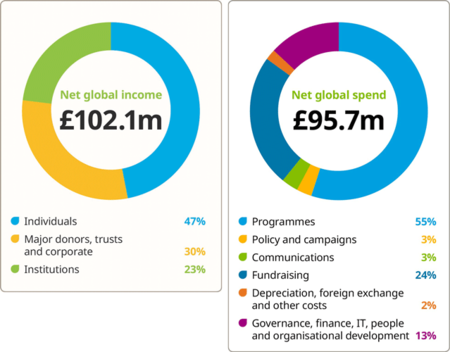In 2017-18 we helped millions of people achieve clean water, decent toilets and good hygiene by working together with communities, governments, businesses and civil society organisations.
By working in partnership, we have strengthened institutions, provided models for others to replicate, and advocated for changes in policy and practice.
Our aims are interconnected and complementary. They are:
-
Equality – we tackle the inequalities that prevent the poorest and most marginalised people from realising their rights to clean water, decent toilets and good hygiene.
-
Sustainable services – we support governments and service providers to strengthen systems to deliver services that last.
-
Integration – we work with others to accelerate change by integrating water, sanitation and hygiene into sustainable development.
-
Hygiene – we positively influence hygiene behaviour to maximise the benefits of access to clean water and decent toilets.
You can find examples of our impact on these aims by clicking on the links below:

It is hugely satisfying to see firsthand how, by working directly with communities to install clean water and decent toilets, and to improve hygiene, we help them transform their lives. This vital aspect of our work not only provides direct benefit but also keeps us connected to the people we serve, and allows us to test and prove new approaches.
For an even bigger impact, we actively promote these approaches for others to use. To make such transformations normal for everyone, everywhere by 2030, we also work with others – especially governments, businesses and civil society organisations. This means we can spark chain reactions that secure greater improvements than we could achieve by ourselves.
In Mali, for example, we ran a programme over three years to integrate water, sanitation and hygiene into 23 health care facilities with a combined catchment of over 1.8 million people. We then produced good practice guidelines based on the experience, in partnership with the Ministry of Health and World Health Organization. Other partners are using these to improve another 450 facilities across the country.
Combining direct delivery with this kind of collaboration and influencing is the heart of our global strategy.
Together, the world as a whole has many successes to celebrate. Since 2000, 1.4 billion people have gained access to clean water and decent toilets.
But this progress is nowhere near fast enough. Around 289,000 children under five die every year from diarrhoeal diseases caused by poor water and sanitation. That is almost 800 children a day.
At our current pace, everyone in low- and middle-income countries will only have safely managed water by 2064, and safely managed sanitation by 2107. This is a crisis, and we all need to address it with more urgency.
To ensure we combine our own efforts as effectively as possible, the seven national members of the WaterAid Federation - Australia, Canada, India, Japan, Sweden, the UK and the US - all share the same global strategy. Together we focus on:
- Equality: we tackle the inequalities that prevent the poorest and most marginalised people from realising their rights.
- Sustainable services: we support governments and service providers to strengthen systems to deliver services that last.
- Integration: we work with others to develop plans that accelerate change by integrating water, sanitation and hygiene into sustainable development.
- Hygiene: we positively influence hygiene behaviour to maximise the benefits of access to safe water and sanitation.
Achievements at a glance
Together with our partners we reached millions of people like Matu from Sierra Leone who directly benefited from our work installing clean water and decent toilets, and promoting good hygiene, in their homes, schools and healthcare centers.

In addition to our direct reach numbers above, we:
Worked with governments to change 14 national policies, strategies or standards.
Worked with governments to change 14 national policies, strategies or standards.
Improved water service management in 26 urban public utilities.
Improved water service management in 26 urban public utilities.
Strengthened management capacity to deliver clean water, decent toilets and good hygiene in 84 rural districts.
Strengthened management capacity to deliver clean water, decent toilets and good hygiene in 84 rural districts.
We indirectly benefited millions by influencing and strengthening the policies and practices of governments, businesses and civil society organisations, so that we can spark lasting change on a bigger scale.
We do this by:
- Convincing governments to change laws and policies
- Strengthening service providers’ capacity
- Changing attitudes and behaviours
- Pooling knowledge and resources
- Rallying support from people and organisations around the world.
Our cause receives huge support from the general public worldwide, with over 400,000 people actively volunteering, donating and campaigning.
Equality
Together with our partners we are determined to reach everyone, whatever their gender, age or ability, like Rekha from Nepal. Water and sanitation are human rights; it is each UN Member States’ duty to ensure everyone can claim them equally.

We and other organisations are increasingly understanding and addressing why people do not have these services. We are also supporting them to engage with governments to make decent facilities normal for everyone. But slow progress and weak accountability mean millions of people are still being left behind.
Empowering people to claim their rights, and holding governments responsible for addressing discrimination, brings long-term changes in attitudes, policies and laws. We are working to change and strengthen systems so that everyone’s rights are fulfilled, sustainably.
Sustainable services
To make a lasting difference, clean water, decent toilets and good hygiene need to remain a normal part of daily life long after being introduced. This takes the right skills and financing, strong utilities and supporting systems, and tried and tested behaviour change.

Recognition is growing of the need to invest in these areas, but action has been slow. Too many other organisations simply build facilities and hand them to communities without ensuring they can be maintained. Facilities break, and people return to unhealthy habits.
By strengthening every part of the systems involved, from the national to the local and adapting to each context, we help communities feel the benefits long after we have gone.
Integration
The challenges that marginalised people face cannot be separated into isolated issues – so neither can the solutions. Clean water, decent toilets and good hygiene are an essential foundation for people's human rights.

By integrating plans and policies between different sectors, such as health, nutrition and education, we can make a bigger difference. However, despite growing interest in this, governments are rarely integrating work across sectors. Opportunities are being missed, and progress restricted.
Leaders need proof that integration works, so we are sharing evidence from our work and beyond, to influence change at local and global levels.
Hygiene
We welcome the increasing global attention being paid to hygiene. However, this has focused mostly on handwashing with soap, when people benefit more by combining this with food hygiene, staying clean during their periods, and keeping homes and hospitals clean.

This takes more than adequate facilities – hygienic habits are essential. And changing behaviours is hard. But growing evidence shows that behavioural psychology approaches work better than traditional one-off hygiene lessons.
Our experience also demonstrates what is needed to make it normal for everyone, everywhere to practise good hygiene. Integrating a package of interventions, including evidence-based hygiene promotion with water and sanitation improvements, and with health, nutrition and education policies, is key.
Our Partnerships
Together, we have a bigger impact. Here are just a few examples of our partnerships with governments, businesses and civil society organisations.
To discuss how we could work together, please contact your nearest WaterAid member.>
Finances
Between 2017-18, our net global income was £102.1 million, and our net global spend was £95.7 million.

For the year 2017-18, 47% of our income came from individuals. 30% came from major donors, trusts and corporates, and 23% came from institutions.
Over half our spend went to programmes, 3% on policy and campaigns, 3% on communications, 24% on fundraising efforts, 2% was depreciation, foreign exchange and other costs and 13% was spent on governance, finance, IT, people and organisational development.
These summary accounts are based on audited accounts for each federation member. Please see each member’s annual report for details.
Net global income is net of transfers from other members. Net global spend is net of other member funding.
Find out more and get in touch
Contact federation and federation member offices
References
1. Numbers for households and schools = people who use these services every day. Numbers for healthcare facilities = the population each facility exists to serve, adjusted to reflect the scale of alternative / private provision.
2. People reached either through facilities or sustained promotion. Hygiene promotion numbers are estimates of people reached with hygiene promotion messages at least three times in a year through local marketing campaigns in communities, in schools and via local health services.





























